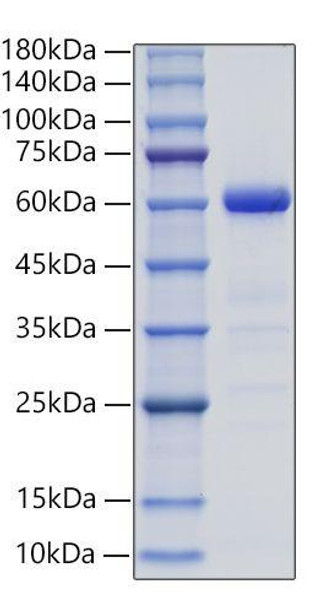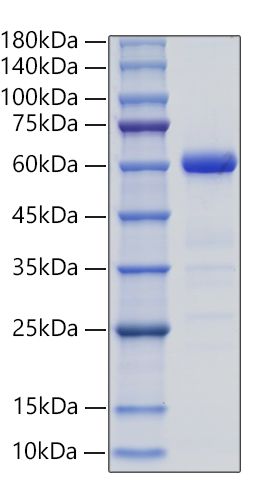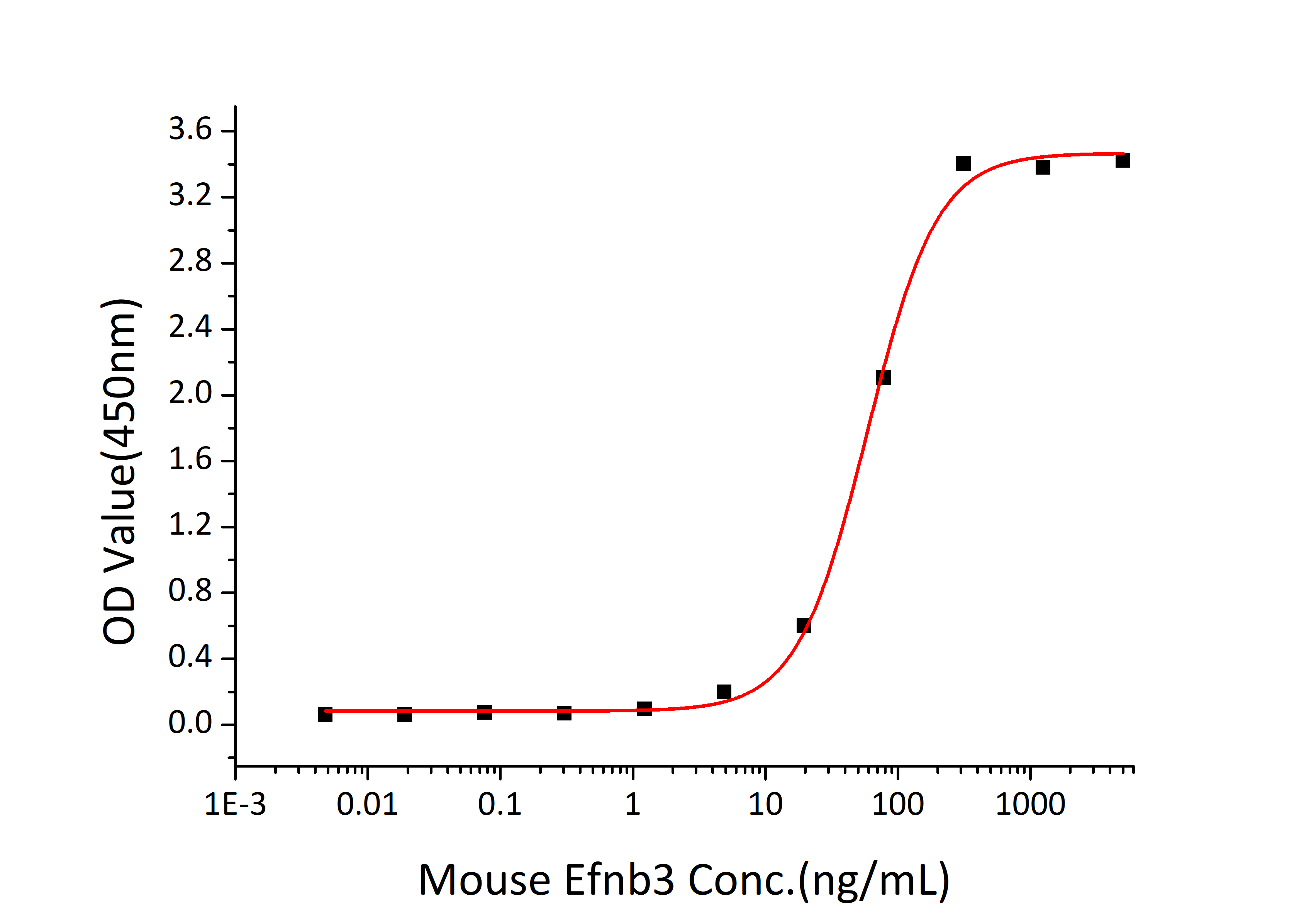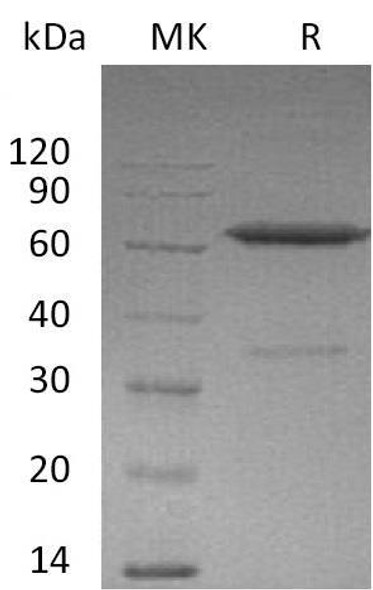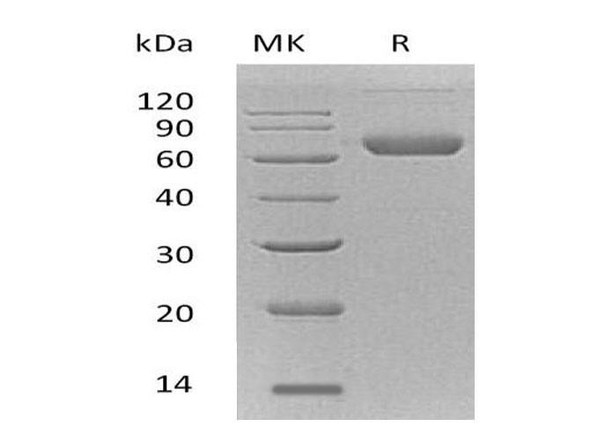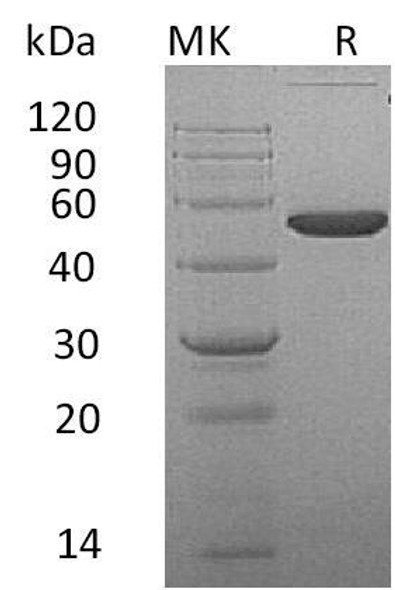Description
Recombinant Mouse Ephrin-B3/EFNB3 Protein
The Recombinant Mouse Ephrin-B3/EFNB3 Protein is a high-quality recombinant protein designed for murine biological research applications. This protein serves as an essential reagent in mouse model studies, comparative immunology research, and preclinical therapeutic evaluations, enabling scientists to investigate Ephrin-B3/EFNB3 biology and its relevance to human disease mechanisms through translational research approaches.
This product (SKU: RPCB0102) is produced using advanced expression systems and features a C-hFC tag for convenient detection and purification. The protein exhibits a calculated molecular weight of 47.88 kDa with an observed molecular weight of 60 kDa under denaturing conditions, achieving ≥ 95 % as determined by SDS-PAGE.. Functional bioactivity has been validated through rigorous quality control assays, confirming its suitability for demanding research applications.
Key Features
| High Purity by Affinity Chromatography | |
| Mammalian & Bacterial Expression Systems | |
| High lot-to-lot consistency via strict QC |
| Product Name: | Recombinant Mouse Ephrin-B3/EFNB3 Protein |
| SKU: | RPCB0102 |
| Size: | 10 μg , 20 μg , 50 μg , 100 μg |
| Reactivity: | Mouse |
| Synonyms: | Ephrin-B3, Efnb3 |
| Tag: | C-hFC |
| Calculated MW: | 47.88 kDa |
| Observed MW: | 60 kDa |
| Gene ID: | 13643 |
| Protein Description: | High quality, high purity and low endotoxin recombinant Recombinant Mouse Ephrin-B3/EFNB3 Protein (RPCB0102), tested reactivity in HEK293 cells and has been validated in SDS-PAGE.100% guaranteed. |
| Endotoxin: | < 0.01 EU/μg of the protein by LAL method |
| Purity: | ≥ 95 % as determined by SDS-PAGE. |
| Formulation: | Lyophilized from 0.22 μm filtered solution in PBS (pH 7.4). Normally 8% trehalose is added as protectant before lyophilization. |
| Bio-Activity: | Measured by its binding ability in a functional ELISA. Immobilized Mouse EphB2(RPCB1503) at 2 μg/mL (100 μL/well) can bind Mouse Efnb3 (RPCB0102) with a linear range of 0.50-58.76 ng/mL. |
| Reconstitution: | Centrifuge the vial before opening. Reconstitute to a concentration of 0.1-0.5 mg/mL in sterile distilled water. Avoid vortex or vigorously pipetting the protein. For long term storage, it is recommended to add a carrier protein or stablizer (e.g. 0.1% BSA, 5% HSA, 10% FBS or 5% Trehalose), and aliquot the reconstituted protein solution to minimize free-thaw cycles. |
| Storage: | Store at -20℃.Store the lyophilized protein at -20℃ to -80 ℃ up to 1 year from the date of receipt. After reconstitution, the protein solution is stable at -20℃ for 3 months, at 2-8℃ for up to 1 week. |
Ephrin B3 belongs to the ephrin family. Ephrins are divided into the ephrin-A (EFNA) class, which are anchored to the membrane by a glycosylphosphatidylinositol linkage, and the ephrin-B (EFNB) class, which are transmembrane proteins. Ephrin B3 is important in brain development as well as in its maintenance. It is especially important for forebrain function since its expression levels were particularly high in several forebrain subregions compared to other brain subregions. Ephrin B3 binds to, and induce the collapse of, commissural axons/growth cones in vitro.

